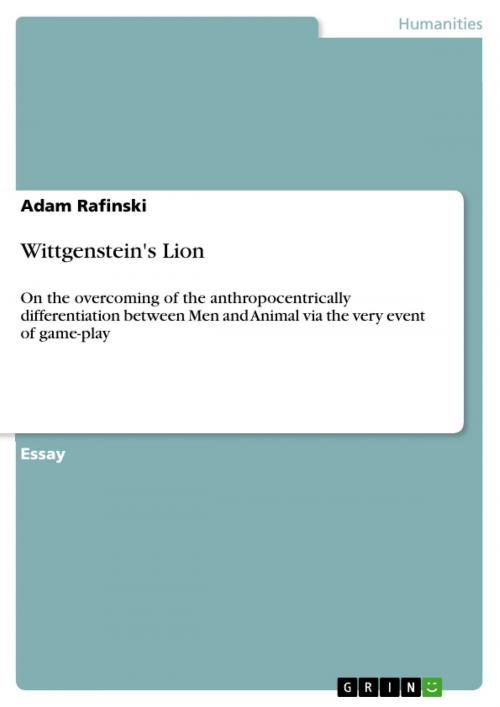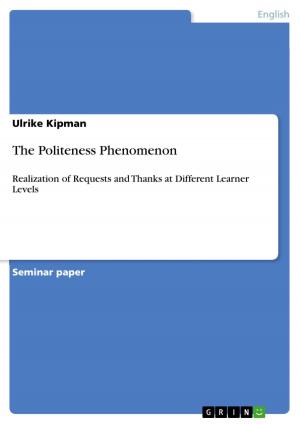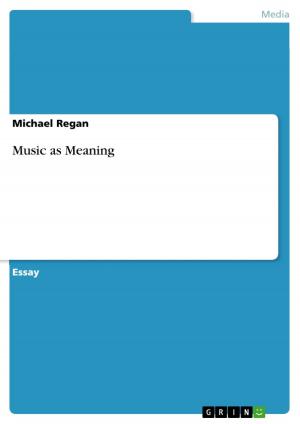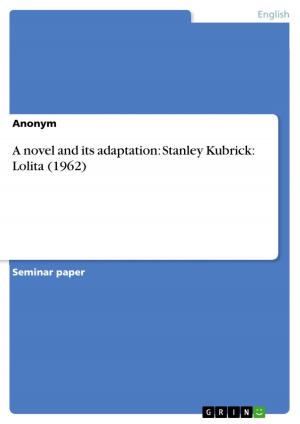Wittgenstein's Lion
On the overcoming of the anthropocentrically differentiation between Men and Animal via the very event of game-play
Nonfiction, Religion & Spirituality, Philosophy| Author: | Adam Rafinski | ISBN: | 9783640361045 |
| Publisher: | GRIN Publishing | Publication: | June 29, 2009 |
| Imprint: | GRIN Publishing | Language: | English |
| Author: | Adam Rafinski |
| ISBN: | 9783640361045 |
| Publisher: | GRIN Publishing |
| Publication: | June 29, 2009 |
| Imprint: | GRIN Publishing |
| Language: | English |
Essay from the year 2009 in the subject Philosophy - Theoretical (Realisation, Science, Logic, Language), grade: 1, Bard College (Literatur, ), course: Wittgenstein's Lion, language: English, abstract: 'If a lion could talk, we could not understand him.' (Wittgenstein 1958, P. 223) Conducted by this famous quote from Ludwig Wittgenstein, this paper concerns the anthropocentrically gap between Men and Animal in two parts: The goal of first part, entitled 'Wittgenstein's Lion speaks', is to throw a spotlight on this dark phrase regarding its meaning, possibility and actual consequence for the philosophical relationship between the animal and the human today. I will begin by posing the question of the meaning of this event. By analyzing the use of the metaphor of the lion I will ask for the content of his speech. Then I will ask for the possibility of the lion giving this speech after the death of truth. But before that, I will also raise the question of the ontological difference between animal and man. And finally I will conclude by raising the question in which form his words would appear to us today. The goal of the second part, entitled 'Wittgenstein's Lion at play', will be to call into question a theory of language that deals with the notion of game-play as a possibility to overcome the anthropocentric gap under the onto-metaphysical condition that I already extracted in the first part. Although I am very aware that what follows might overstretch some ideas by Wittgenstein a little bit, I have to give my strong suspicion concerning the relationship between Wittgenstein's 'language-game' and his 'form of life', as a ideal starting point to leave our anthropocentric prison of reason, some space. Taking the thoughts of one of the most ambitious logical thinker in the age of posthistoire literally, I will have to give Wittgenstein's ideas some 'form of life' by doing exactly what his theory of language calls for: by playing with it in a close reading.
Essay from the year 2009 in the subject Philosophy - Theoretical (Realisation, Science, Logic, Language), grade: 1, Bard College (Literatur, ), course: Wittgenstein's Lion, language: English, abstract: 'If a lion could talk, we could not understand him.' (Wittgenstein 1958, P. 223) Conducted by this famous quote from Ludwig Wittgenstein, this paper concerns the anthropocentrically gap between Men and Animal in two parts: The goal of first part, entitled 'Wittgenstein's Lion speaks', is to throw a spotlight on this dark phrase regarding its meaning, possibility and actual consequence for the philosophical relationship between the animal and the human today. I will begin by posing the question of the meaning of this event. By analyzing the use of the metaphor of the lion I will ask for the content of his speech. Then I will ask for the possibility of the lion giving this speech after the death of truth. But before that, I will also raise the question of the ontological difference between animal and man. And finally I will conclude by raising the question in which form his words would appear to us today. The goal of the second part, entitled 'Wittgenstein's Lion at play', will be to call into question a theory of language that deals with the notion of game-play as a possibility to overcome the anthropocentric gap under the onto-metaphysical condition that I already extracted in the first part. Although I am very aware that what follows might overstretch some ideas by Wittgenstein a little bit, I have to give my strong suspicion concerning the relationship between Wittgenstein's 'language-game' and his 'form of life', as a ideal starting point to leave our anthropocentric prison of reason, some space. Taking the thoughts of one of the most ambitious logical thinker in the age of posthistoire literally, I will have to give Wittgenstein's ideas some 'form of life' by doing exactly what his theory of language calls for: by playing with it in a close reading.















